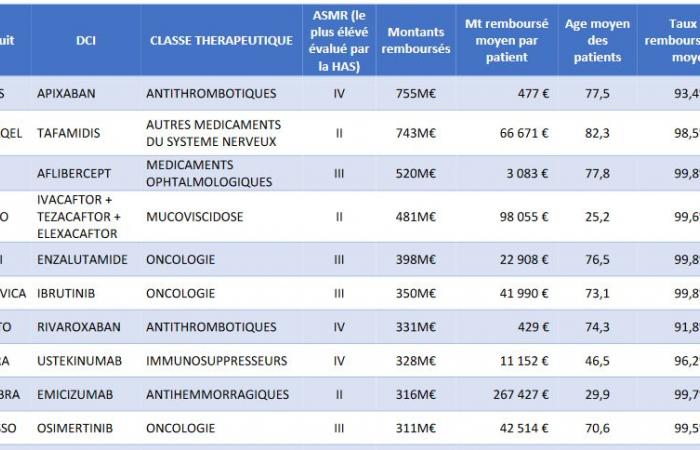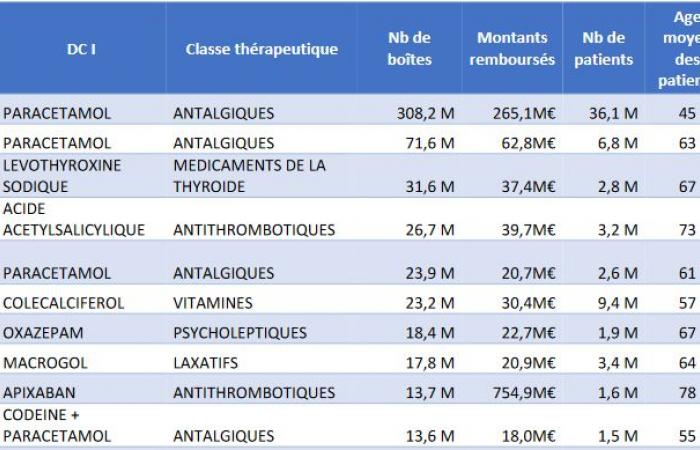The figures speak for themselves: in 2023, Health Insurance reimbursed 25.5 billion euros worth of medicines, compared to 22.8 billion euros in 2019*. “After a phase of relative stability“, the figures started to rise again in 2021, with an average increase of 3.4% per year, noted Thomas Fatôme, general director of Cnam, during a press point dedicated to the “fair use” of medicines, Thursday 14 november.
France is indeed a champion in this area: with 41 boxes reimbursed on average per year and per inhabitant (109 for those over 79) and an average expenditure of 410 euros (1075 for the oldest), the country ranks in the top 3 at European level. The French are thus the leading consumers of paracetamol and among the top five when it comes to antibiotics. The proper use of the medication is therefore a “major issue” for Health Insurance, both in terms of public health and “sustainability” of the health system, recalled the boss of the Cnam.
“We have tried over the last two to three years, through the agreements signed with pharmacists and doctors, to strengthen the proper use of health products“, underlined Marguerite Cazeneuve, deputy director of the Cnam. The medical agreement signed last June includes “collective commitments” in this area: five of the 15 “relevance programs” relate to medicines.
Doctors and the Cnam notably aim to reduce the volume of antibiotics prescribed by 25% by 2027, and by 10% from 2025. “If the indications for amoxicillin were better respected, there would be less shortages”, insisted Thomas Fatôme. If the year of 2023 allowed a decline to begin, Health Insurance is banking on the development of Trod angina and cystitis in pharmacies and on the use of the antibioclic tool, which it is finance.
Another issue is that of IPPs. 50% of uses would be unjustified with regard to HAS recommendations, particularly among young children. To reverse the trend, the new agreement has set up a profit-sharing scheme for the deprescription of PPIs.
While 70% of policyholders benefited from at least one reimbursement for painkillers in 2023 (for an expense of 487 million euros) and Doliprane is at the top of the most prescribed medications (308 million boxes reimbursed), Health Insurance is concerned about the increase in prescriptions for level 2 painkillers: 11.5 million patients were prescribed them last year. To combat misuse and fraud, tramadol and codeine will have to be subject to a secure prescription in the coming weeks.
Health Insurance is also taking action on polypharmacy** and hyperpolypharmacy***, which respectively concern 6.7 million and 1.6 million patients over 65 years old. For this, it relies on complementary action by the pharmacist, called upon to carry out a medication assessment (paid 400 euros), and by the attending physician, who will conduct a deprescription consultation (chargeable 60 euros, once a year for patients over the age of 80 years, from 1is January 2026). “For the deprescription consultation to go well, it must be based on the medication assessment”underlines Marguerite Cazeneuve, who calls on doctors to prescribe these assessments. Objective: reduce the chronic treatment of hyperpolymedicated and polymedicated patients over 65 years of age by 4 and 2 molecules respectively.
Finally, the signatories of the agreement undertake to increase the share of prescriptions in the therapeutic indications for reimbursement (ITR) and the treatment durations recommended by the HAS to reach a rate of “compliant prescriptions” of 80%. As such, a reinforced prescribing system will soon be put in place for certain drugs with a high risk of misuse, such as AGPL-1. By means of a teleservice accessible on Ameli, doctors will have to ensure that their Ozempic prescription complies with its ITR, restricted to diabetic patients. The stakes are high: the drug, which also has marketing authorization for obesity, quickly ranked in the top 20 drugs reimbursed in 2023, with an expenditure estimated at 251 million euros.
A campaign aimed at patients
Aware that he isalso necessary to act towards policyholders“, Health Insurance has launched a general public communication campaign on the correct use of medication. A BVA survey has shown that one in two French people questioned expects a prescription for medication as a priority after a consultation. and that in France, only 1 in 5 consultations do not result in a medication prescription. 82% of the general practitioners surveyed also report feeling a form of pressure from their patients to prescribe medication.
*Net expenses excluding discounts and safeguard clause.
**Patients with delivery of at least 5 different molecules at least three times a year
***At least 10 different molecules at least 3 times a year







